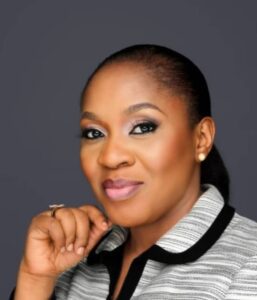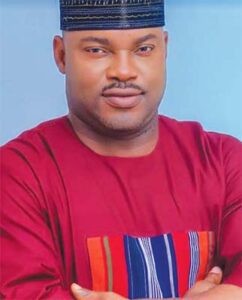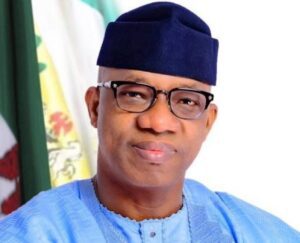
Vitafoam at 60: Global standards remain our benchmark — Taiwo Adeniyi
Leading manufacturer of foam products in West Africa, Vitafoam Nig plc, clocks 60 years of operation. In this interview with Nigerian NewsDirect, the Group Managing Director, Mr TAIWO ADENIYI, trails the success story of the organisation, its expansion trajectory, and future projections. Excerpts:
How did Vitafoam Nigeria Plc begin?
Vitafoam Nigeria Plc, Nigeria’s leading manufacturer of flexible, reconstituted and rigid foam products with the largest foam manufacturing and distribution network in West Africa, was incorporated on 4th of August, 1962 and listed on the floor of the Nigerian Stock Exchange in 1978, Vitafoam’s brands remain household names in the Country. The Company’s commitment to quality in its production process has earned it several quality awards including the Gold Certificate Award for most of its products. Vitafoam was the first Foam Manufacturing Company in Nigeria to subject its quality system to the Quality Management System championed by the Standards Organization of Nigeria (SON). The NIS ISO 9002 Certificate was obtained in 2001 and upgraded to NIS ISO 9001: 2008 in 2015. The certification body recertified the company and upgraded its certificate to ISO 9001:2015 in November, 2020.
What distinguishes Vitafoam from the crowd in its operations?
We offer a vast array of high and superior quality products that present the customers with multiple unique choices. We do not benchmark ourselves with what is available in the market. We benchmark ourselves with global standards and what global standards say is that your product must be fit for a purpose. Customer-centricity is at the centre of our operations.
The sustained growth and good performance from the company is predicated on customer centric operations, focused on quality from the view point of our customers. In Vitafoam, our investment in state-of-the-art Technology and People have been the driving force and key success factors. Vitafoam has invested in young talents that today, over 80% of the workforce are below the age of 50. At 60, we are celebrating heritage of quality because we have mastered the art and the technology. We are good in bed.
The Company has consistently posted robust returns despite the tough operating environment, what are the facts behind the figures?
The company has been consistently keeping to its core values, which keep to (1) Quality (2) Service (3) Sustainable action (4) Integrity (5) Respect for others and (6) Culture. These values have in no small ways helped Vitafoam Nigeria plc to weather the storms and turbulence over the years. Our predecessors laid a very solid foundation upon which the present management has been building upon and of which the future management shall adhere to. Also, the company has a very dedicated and committed Board, Management and Staff who have continued to contribute their quotas towards the success story of Vitafoam. At Vitafoam, we are 100% committed to our brand promise and customer satisfaction.
What are the areas the company is trying to improve upon?
As a customer-centric organisation that is passionate about the comfort and wellbeing of Nigerians, continuous improvement is our watchword. We intend to engage more with our customers and continue to develop capacities of our workforce to embrace smart sourcing and smart operations. Also, the company, being heavily dependent on foreign exchange for its raw materials and with the ever-increasing forex challenges, is working tirelessly towards investing in export-oriented business(s), this would be a more sustainable strategy to protect the future of the core business (Vitafoam). The Company is consolidating its core business by the introduction of innovative value-added products and services. It has become a full range solution provider for bedding and allied products. Its Comfort Centers provide a one stop shop for discerning consumers to experience its products in a unique way, and continuous expansion of our Comfort Centres to enable all Nigerians to experience our products wherever they live within the country.
What is your message to the shareholders?
Our Shareholders should stay calm, trust their company and be assured of higher returns on their investments, in terms of higher earnings, dividends, market value of their shares, not minding the difficulties in the Nigerian economy. Their company is in safe and good hands.
What about the customers?
Our Customers are strictly assured of quality products that continue to meet and exceed their expectations at a price that meet value. Vitafoam is very committed to deliver on this promise to our teeming customers. To the general public, I encourage you to be deliberate in having quality sleep, sound mental health and healthy living. Health, they say ‘is wealth’. You can visit our website blog http://www.vitafoamng.com/store/blog/ for great articles written by Dr. Charles Uzodimma on Quality Sleep and Healthy Living.
At 60, what will you identify as the company’s most important achievements?
At 60, the business has successfully delivered the dream of a Vitafoam beyond mattresses; “much more than mattresses”. The business diversification was strategically targeted at turning our competitors to our customers. The birth of five (5) subsidiaries and expansion to Sierra Leone in the last 10 years has delivered that aspiration and keeps adding value to the business in no small measure.
Vitafoam over the years has metamorphosed from being a household name in the production of just mattresses and pillows into being a foremost provider of ultimate comfort products. Over the years, we have transcended beyond the sleep business to the living business, as we now manufacture semi rigid and rigid polyurethane foam products including furniture, bed and bedding, insulated panels, car oil filter, and molded products that make you experience total comfort.
While others are running to Europe and other places to look for materials; those materials are manufactured by our subsidiaries and supplied to Vitafoam. These are part of what we are benefiting from setting up these subsidiaries and they have been of tremendous help to the operations of Vitafoam.
Also, we have impacted greatly in the society we operate through various corporate social responsibility (CSR) initiatives. The polyurethane laboratory that Vitafoam donated to University of Lagos in 2018 has helped many students and researchers within and outside the university community. Vitafoam as a group has generated great employment opportunities and business opportunities for Nigerians, as we have the highest distribution network in West Africa. Our tradition of celebrating the first baby of the year, products donations to hospitals, orphanage homes and schools are some of our initiatives reflecting that the impact is truly far reaching. Every year, we sponsor the i-create club in nurturing and developing creativity in primary schools’ pupils.
Currently, Vitafoam has signed an agreement with a certified sleep expert, Dr Charles Uzodimma, and he has been educating Nigerians via a weekly article on Quality Sleep and Healthy living because we are truly passionate about the general wellbeing of Nigerians.
Can you briefly tell us the various problems that Vitafoam subsidiaries are providing solutions to in the Nigerian Economy?
Vitafoam in her vision and foresight, thought it wise to develop businesses that will cater for the various household furnishings and in recent times automobile parts: Vitablom Nigeria Limited, incorporated in 2010 offers our customers a vast array of high quality pillows, bedsheets and duvets for everyone including mother and child. Vitablom is a major player in the soft furnishing, beddings, flat sheet fibre and scouring sponge market in Nigeria.
Vitaparts Nigeria Limited, established in 2016 and commissioned in 2021, is the pioneer manufacturer of oil filters for automobiles in Nigeria. Vitaparts currently produces two variants of oil-filters for automobiles: Spin-on filter and Cartridge filter.
Vitapur Nigeria Limited, established in 2009 and commissioned in 2010, is an insulation manufacturing company into the production of Rigid Polyurethane foam insulation products. Vitapur manufactures, fabricates, and installs its various polyurethane rigid foam products, some of which include Prefabricated buildings, Sandwich panels, Insulation boards, Chemicals systems, and Pre-cut pipe sections.
Vitavisco Nigeria Limited, incorporated and commissioned in 2012, is a manufacturing company using polyurethane to provide unique lifestyle products and services which offers comfort in homes, offices and industries. Vitavisco has created a number of products which at the moment border on use of molded viscoelastic and high resilience range of polyurethane foam.
Vono furniture Products limited was established in 2016 as a fully owned subsidiary of Vitafoam Nigeria Plc. The Company is positioned to provide furniture products for the Hospitality, Offices & Homes and Institutions. Vono Furniture Products Plc was acquired by Vitafoam Nigeria Plc before Vono furniture Products limited was incorporated.
The Company’s 60th Anniversary has played up the concept of ‘Vitafoam is truly Nigerian’, can you explain?
Vitafoam Nigeria Plc is the first Foam Manufacturing Company in Nigeria to subject its quality system to the Quality Management System championed by the Standards Organization of Nigeria. In addition, Vitafoam Nigeria Plc is the first foam manufacturing company in Nigeria to partner with a Sleep Expert in educating Nigerians on Quality Sleep and Healthy Living. We are truly passionate about quality sleep, healthy living and general wellbeing of Nigerians. Vitafoam is proudly Nigerian and constantly supports Nigerians with consistent quality products for comfort and wellbeing.
Our distribution networks cover the whole Nigeria. Our factories are strategically located in Ikeja, Kano, Jos and Aba to effectively ensure prompt delivery of our products to any location in Nigeria. We have quality products offer to all Nigerians; no matter your age, height, weight or income. We truly believe in the Nigeria dream and we are committed as a corporate citizen of Nigeria in all our business operations.
What is Vitafoam bringing to the table in the next 60 years?
Vitafoam in the next 60 years will further explore innovations and exceptional customer experience, leveraging technology and professionalism to grow into a full fledge blue chip company with capacity to churn out environmentally friendly products. We intend to grow our system house to produce raw materials needed in our operations as substitutes to imported materials. The next 60 years will be built on our legacies of innovation, integrity and exceptional customer experience; leveraging technology and professionalism to produce quality products, as we are committed to producing ground-breaking products that will support Nigerians with great comfort and total wellbeing, and that will make Nigerians experience the Good Life.
Manufacturers are contending with many challenges in Nigeria. Can you identify some of these issues, the impacts on the business and the way forward on the part of the government?
Challenges being faced by manufacturers are numerous and not abating. The major challenges include, high inflation, poor energy (electricity) supply, increase in diesel pump price, scarcity of forex (Fx), poor road networks for seamless logistics, insecurity, and so on. All these highlighted issues are impacting heavily on the cost of production. Inflation results in less disposable income in the hands of consumers (customers) therefore, translates to less patronage for goods and services, as more people may not be able to afford the prices for manufactured goods.
Recently, the worst challenge has been the scarcity of FX to source materials needed in manufacturing operations. The effects are the high cost of doing business with direct impact on purchasing power amidst dwindling income. These get the people poorer and unable to afford good products. Manufacturers continue to grow lean, produce less and employ less, leading to declining productivity as a result of scarcity of FX.
Our Government should continue to encourage manufacturing for exports, have the political will to change the narratives in terms of refining the petroleum products that we consume and producing major stapple/basic foods that we consume, such as rice, corn, wheat, beans, palm oil, vegetable oil, groundnut oil, and so on.
What is your final message?
I want to use this opportunity to thank all stakeholders; shareholders, members of staff, clients, distributors, suppliers, transporters, institutional partners, customers, consumers, regulatory agencies and media partners for their contribution to Vitafoam’s success story. A journey of 60 years is no easy feat, not for any human being and definitely not, for any establishment. Gratitude fills our mind when I think of how far we have come. I want to use this opportunity to appreciate everyone who has supported us at one time or the other in making Vitafoam a household name and a respected brand. We sincerely appreciate our esteemed staff – the ones who have toiled to keep the dreams of the organisation alive, our Alumni and founding fathers – who laid the foundation and made sacrifices to achieve the greatness that is Vita.



